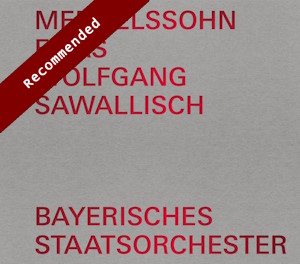
Felix Mendelssohn (1809-1847)
Elias, Op. 70 (1846)
Dietrich Fischer-Dieskau (baritone) – Elias
Chor des Städtischen Musikvereins zu Düsseldorf
Bayerisches Staatsorchester/Wolfgang Sawallisch
rec. live, 4 July, 1984, National Theater, Munich
Sung in German with German notes and text, English translation included
Bayerische Staatsoper Recordings BSOREC0003 [126]
The Bavarian State Opera has recently launched its own label, and with this release comes their first archival recording, made at a concert in 1984. As the informative booklet notes, this recording has been waiting to be released commercially for 39 years! The tapes were originally earmarked to be released by an unnamed record label but a sudden temporary insolvency prevented that from happening, which has left them sitting in the archives of the Bavarian Radio ever since.
Of all of the oratorios that I have ever encountered Elias/Elijah is the one that seems to be the stuffiest, and to my ears it is too firmly stuck in the Victorian era. However, after auditioning this, I now see that there are rare times when everything can come together in a performance of presence and power; this is one of those times, so this release is a cause for celebration.
Wolfgang Sawallisch had previously recorded a thoroughly professional version of Elias in Leipzig in 1968 for Philips. That recording has been one of the go-to recordings of German language versions ever since. In 1984 he returned to the oratorio to mark the dual occasions of the opening of the annual Munich Opera festival and the 88th German Catholic Congress. The booklet notes point out that the demand for tickets was so huge that the unusual step of opening ticket sales for a dress rehearsal was instituted. One can feel something of the audience excitement when listening to these CDs.
The orchestra has barely sounded its first few notes when the power and sweep of Sawallisch’s reading comes through to the listener. The weighty approach that he takes with the orchestra immediately transitions to the chorus, completely overwhelming in its plea for the Lord’s help. Sawallisch presents this work with drama, urgency and a constant forward momentum. The only false step he takes is a too lengthy pause in the transition between the soprano aria “Höre, Israel“and the chorus that immediately follows it, somewhat robbing the chorus of its surging power and momentum. The Düsseldorf chorus was hired because the regular opera house chorus was considered to be over engaged at the time. They are a superb ensemble, responsive to what Sawallisch aims to achieve. Their ability to shift dynamics on a pinpoint is quite breathtaking.
The cast is headed by the powerful Elijah of Fischer-Dieskau. He sings his phrases with the granite-like stance that the prophet’s utterances demand. His voice is well controlled with authoritative tone. Only once or twice does a bit of bluster creep into his vocal line. Peter Schreier’s contribution to the first tenor music is beautifully shaded, although his vocal production is less free than when he sang the role for Sawallisch in the 1968 recording. Margaret Price sings the first soprano role with power and authority. Her voice has a natural grandeur; her version of “Höre, Israel“ sung with a round pure tone, leans toward the more weighty Gwyneth Jones on Rafael Frühbeck de Burgos’ EMI recording (in English) than Elly Ameling’s silvery account for Sawallisch on the Philips version. Brigitte Fassbaender’s distinctive plangent timbre makes one sit up and take notice of the Angel’s utterances. Cornelia Wulkopf as the second mezzo/Queen is merely reliable among the assembled company of this distinguished cast.
The sound is very forthright and immediate, much more so than almost every other recording that I have heard made in the National Theater. This is likely because the concert allowed for closer microphone placement than a staged opera would permit. Everything is captured with fine detail and any audience noise is undetectable. There is no applause included in the recording.
Competition among the German versions of Elias/Elijah comes primarily from Sawallisch himself. A later live recording made 17 years later in the Herkulessaal, and released on Profil (review), is no competition for the present version. His 1968 Philips version has the benefit of a more spacious sounding acoustic but the dramatic pacing does not quite equal this one. The earlier recording boasts an equally powerful Elijah from Theo Adam, who sings his runs rather more successfully than Fischer-Dieskau. Schreier has more honey in his tone in 1968 but Annelies Burmeister certainly out-sings Mme Wulkopf. Elly Ameling’s account of the first soprano role is ethereal and probably much closer to what Mendelssohn intended when he composed the role specifically for Jenny Lind. Her version of “Höre, Israel“ is the touchstone by which I measure others in the part. While I would not want to be without the 1968 recording this one must take the honours because of its superior pacing and the realistic sense of a rare event that is occurring. It is certainly streets ahead of Paul Daniel’s Decca recording of the English version, surprisingly stodgy despite the presence of a starry cast and a period orchestra. One can hear a younger, less authoritative Fischer-Dieskau (in English) on the Frühbeck de Burgos recording, also from 1968 and well recorded by EMI. It seems a few more years of life experience really reaps benefits when it comes to the prophet Elijah.
This recording has been released in a deluxe hardcover binding with articles and photos of the rehearsals and the concert. If this is the standard of future recordings from the BSO label than I certainly look forward to what will come next.
Mike Parr
Help us financially by purchasing from



Other performers
Margaret Price (soprano); Cornelia Wulkopf (mezzo); Peter Schreier (tenor); Brigitte Fassbaender (mezzo); Marianne Seibel (soprano); Heiner Hopfner (tenor); Kurt Moll (bass); Waldemar Wild (bass); Tobias Eiwanger, Allan Bergius, Christian Immler, Michael Kiliam (trebles)


















